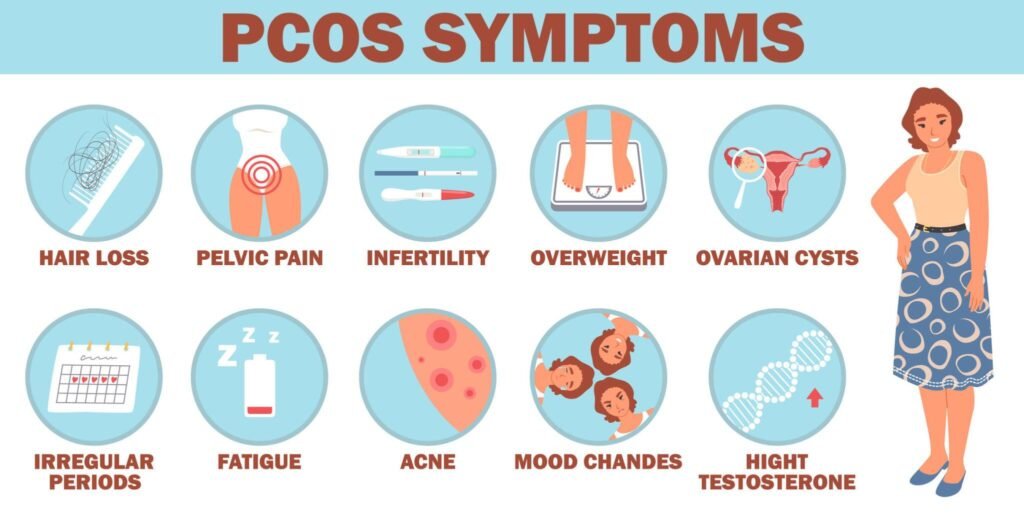PCOS Awareness: Unveiling the Complexity of PCOS, Causes and Compassionate Care

Polycystic Ovary Syndrome (PCOS) is a common but often misunderstood health condition affecting individuals with ovaries. Characterized by hormonal imbalances, PCOS can lead to a range of symptoms, from irregular periods to fertility issues. In this comprehensive guide, we’ll delve into the intricacies of PCOS, exploring its causes and compassionate care options.
Understanding PCOS: A Multifaceted Challenge
PCOS at a Glance: PCOS is a complex hormonal disorder that affects people with ovaries, often during their reproductive years. While the exact cause remains elusive, genetics, insulin resistance, and inflammation are believed to play crucial roles in its development.
Common Symptoms:
- Irregular menstrual cycles
- Elevated levels of androgens (male hormones)
- Ovarian cysts
- Acne, excessive hair growth, and thinning scalp hair

The Root Causes of PCOS:
Genetics: There is a strong genetic component to PCOS. Individuals with a family history of the syndrome are more likely to develop it themselves.
Insulin Resistance: Insulin resistance, a condition where the body’s cells don’t respond effectively to insulin, is a common factor in PCOS. Elevated insulin levels can stimulate the ovaries to produce more androgens, exacerbating PCOS symptoms.
Inflammation: Chronic low-grade inflammation may contribute to the development of PCOS and worsen existing symptoms.
Compassionate Care for PCOS: A Holistic Approach
1. Lifestyle Modifications:
- Nutrition: Adopting a balanced and low-glycemic diet can help manage insulin levels.
- Exercise: Regular physical activity aids in weight management and improves insulin sensitivity.
- Stress Management: Practices such as yoga and meditation can help alleviate stress, positively impacting hormonal balance.
2. Medication and Hormonal Therapy:
- Birth Control Pills: Regulating menstrual cycles and managing androgen levels.
- Anti-Androgen Medications: Addressing symptoms like excessive hair growth and acne.
- Metformin: Improving insulin sensitivity and managing associated metabolic issues.
3. Fertility Treatments:
- Ovulation Induction: Medications like Clomiphene can stimulate ovulation.
- In Vitro Fertilization (IVF): Assisting in conception when natural methods prove ineffective.
4. Emotional Support:
- Counseling and Support Groups: Managing the emotional impact of PCOS, which can include anxiety, depression, and body image issues.
5. Surgical Options:
- Ovarian Drilling: A laparoscopic procedure to reduce androgen levels and improve ovulation.
Navigating PCOS with Medigo Hospitals: A Personalized Approach
At Medigo Hospitals, we recognize the unique challenges posed by PCOS and are committed to providing compassionate and personalized care. Our multidisciplinary team of specialists collaborates to develop customized treatment plans addressing the diverse needs of individuals with PCOS.
1. Comprehensive Diagnosis:
- State-of-the-art diagnostic tools to precisely identify PCOS and its contributing factors.
2. Expert Guidance:
- Specialized endocrinologists, gynecologists, and fertility specialists working together to design effective treatment strategies.
3. Holistic Care:
- Integrating lifestyle modifications, medication, and emotional support for a comprehensive approach to managing PCOS.
4. Fertility Support:
- Assisting individuals on their fertility journey through advanced reproductive technologies and empathetic counseling.
5. Ongoing Support:
- Long-term follow-up and support to adapt treatment plans based on individual responses and evolving needs.
Conclusion: Empowering Lives Beyond PCOS
PCOS is a multifaceted condition that requires a nuanced and compassionate approach to care. By understanding its causes and embracing a holistic treatment strategy, individuals with PCOS can reclaim control over their health and well-being. At Medigo Hospitals, we stand as partners in this journey, offering expertise, support, and a commitment to empowering lives beyond PCOS.
Disclaimer: This blog post is for informational purposes only and should not be considered as medical advice. Consult with a qualified healthcare professional for personalized diagnosis and treatment.
